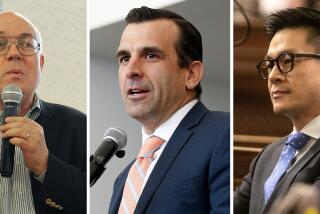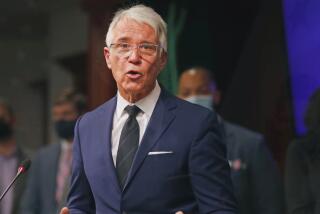Southwest Voter Registration Education Project vs. Kevin Shelley, California Secretary of State
- Share via
Ruling by justices
Richard A. Paez Harry Pregerson
Sidney R. Thomas
*
The inherent defects in the system are such that approximately 40,000 voters who travel to the polls and cast their ballot will not have their vote counted at all. Compounding the problem is the fact that approximately a quarter of the state’s polling places will not be operational because election officials have insufficient time to get them ready for the special election, and that the sheer number of gubernatorial candidates will make the antiquated voting system far more difficult to use....
It is perhaps ironic that the sitting governor could well cast a vote on his own recall that would not be tallied. Many candidates seeking to replace him would face a similar risk. Plaintiffs also allege that the affected counties contain a significantly higher percentage of minority voters than the other counties, causing a disproportionate disenfranchisement of minority voters....
No voting system is foolproof, of course, and the Constitution does not demand the use of the best available technology. However, what the Constitution does require is equal treatment of votes cast in a manner [consistent] with the Equal Protection Clause....
[The recall leader] argues that every voting system is prone to some errors and that we need to allow “some play in the joints.” If there were equal “play in the joints,” this argument would have more force.... Plaintiffs have tendered credible evidence that if the election is held in October, a substantial number of voters will be disenfranchised by voting in counties utilizing pre-scored punch-card technology. Thus, their votes will be diluted in comparison to the votes cast in counties with more modern technology. Once the election occurs, the harm will be irreparable because plaintiffs are without an adequate post-election remedy....
There is a strong public interest in holding elections as scheduled. To enjoin the election of candidates for office has the potential of disrupting government.... In a case of a vote on a recall petition, these concerns are considerably lessened because government functions will continue.... The State has an interest in holding a fair election -- one trusted by the candidates and the voters to yield an accurate and unbiased result. The high error rate associated with the decertified machines to be used by 44% of the voters in October would undermine the public’s confidence in the outcome of the election. The margin of victory could be less than the margin of error in the use of punch-card technology....
A short postponement of the recall election will serve the public interest by permitting California men and women who are serving our country overseas, and who did not anticipate an October election, more time to request and submit absentee ballots, thus allowing them to enjoy one of the fundamental rights for which they put themselves in harm’s way -- the right to vote....
The election laws of California not only do not require that the initiatives be placed on the special election ballot; the laws will be violated if they are placed on the ballot.
In addition to the pubic interest factors we have discussed, we would be remiss if we did not observe that this is a critical time in our nation’s history when we are attempting to persuade the people of other nations of the value of free and open elections. Thus, we are especially mindful of the need to demonstrate our commitment to elections held fairly, free of chaos, with each citizen assured that his or her vote will be counted, and with each vote entitled to equal weight. A short postponement of the election will accomplish those aims and reinforce our national commitment to democracy.
More to Read
Get the L.A. Times Politics newsletter
Deeply reported insights into legislation, politics and policy from Sacramento, Washington and beyond. In your inbox twice per week.
You may occasionally receive promotional content from the Los Angeles Times.










